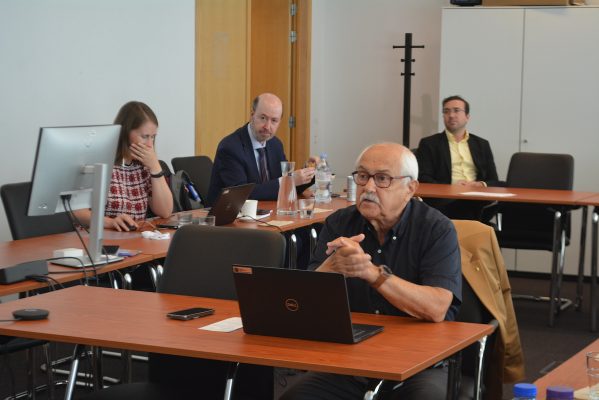
Over the past three years, the RISC2 project has established a network for the exchange of knowledge and experience that has enabled its European and Latin American partners to strengthen relations in HPC and take significant steps forward in this area. With the project quickly coming to an end, it was time to meet face-to-face in Brussels to reflect on the progress and achievements, the goals set, the difficulties faced, and, above all, what can be expected for the future.
The session began with a welcome and introduction by Mateo Valero (BSC), one of the main drivers of this cooperation and a leading name in the field of HPC. This intervention was later complemented by Fabrizio Gagliardi (BSC). Afterward, Elsa Carvalho (INESC TEC) presented the work done in terms of communication by the RISC2 team, an important segment for all the news and achievements to reach all the partners and countries involved.
Carlos J. Barrios Hernandez then presented the work done within the HPC Observatory, a relevant source of information that European and Latin American research organizations can address with HPC and/or AI issues.
The session closed with an important and pertinent debate on how to strengthen cooperation in HPC between the European Union and Latin America, in which all participants contributed and gave their opinion, committing to efforts so that the work developed within the framework of RISC2 is continued.
What our partners had to say about the meeting?
Rafael Mayo Garcia, CIEMAT:
“The policy event organized by RISC2 in Brussels was of utmost importance for the development of HPC and digital capabilities for a shared infrastructure between EU and LAC. Even more, it has had crucial contributions to international entities such as CYTED, the Ibero-American Programme for the Development of Science and Technology. On the CIEMAT side, it has been a new step beyond for building and participating in a HPC shared ecosystem.”
Esteban Meneses, CeNAT:
“In Costa Rica, CeNAT plays a critical role in fostering technological change. To achieve that goal, it is fundamental to synchronize our efforts with other key players, particularly government institutions. The event policy in Brussels was a great opportunity to get closer to our science and technology ministry and start a dialogue on the importance of HPC, data science, and artificial intelligence for bringing about the societal changes we aim for.”
Esteban Mocskos, UBA:
“The Policy Event recently held in Brussels and organized by the RISC2 project had several remarkable points. The gathering of experts in HPC research and management in Latin America and Europe served to plan the next steps in the joint endeavor to deepen the collaboration in this field. The advance in management policies, application optimization, and user engagement are fundamental topics treated during the main sessions and also during the point-to-point talks in every corner of the meeting room.
I can say that this meeting will also spawn different paths in these collaboration efforts that we’ll surely see their results during the following years with a positive impact on both sides of this fruitful relationship: Latin America and Europe.”
Sergio Nesmachnow, Universidad de la República:
“The National Supercomputing Center (Uruguay) and Universidad de la República have led the development of HPC strategies and technologies and their application to relevant problems in Uruguay. Specific meetings such as the policy event organized by RISC2 in Brussels are key to present and disseminate the current developments and achievements to relevant political and technological leaders in our country, so that they gain knowledge about the usefulness of HPC technologies and infrastructure to foster the development of national scientific research in capital areas such as sustainability, energy, and social development. It was very important to present the network of collaborators in Latin America and Europe and to show the involvement of institutional and government agencies.
Within the contacts and talks during the organization of the meeting, we introduced the projecto to national authorities, including the National Director of Science and Technology, Ministry of Education and Culture, and the President of the National Agency for Research and Innovation, as well as the Uruguayan Agency for International Cooperation and academic authorities from all institutions involved in the National Supercomputing Center initiative. We hope the established contacts can result in productive joint efforts to foster the development of HPC and related scientific areas in our country and the region.”
Carla Osthoff, LNCC:
“In Brazil, LNCC is critical in providing High Performance Computing Resources for the Research Community and training Human Resources and fostering new technologies. The policy event organized by RISC2 in Brussels was fundamental to synchronizing LNCC efforts with other government institutions and international entities. On the LNCC side, it has been a new step beyond building and participating in an HPC-shared ecosystem.
Specific meetings such as the policy event organized by RISC2 in Brussels were very important to present the network of collaborators in Latin America and Europe and to show the involvement of institutional and government agencies.
As a result of joint activities in research and development in the areas of information and communication technologies (ICT), artificial intelligence, applied mathematics, and computational modelling, with emphasis on the areas of scientific computing and data science, a Memorandum of Understanding (MoU) have been signed between LNCC and Inria/France. As a result of new joint activities, LNCC and INESC TEC/Portugal are starting collaboration through INESC TEC International Visiting Researcher Programme 2023.”